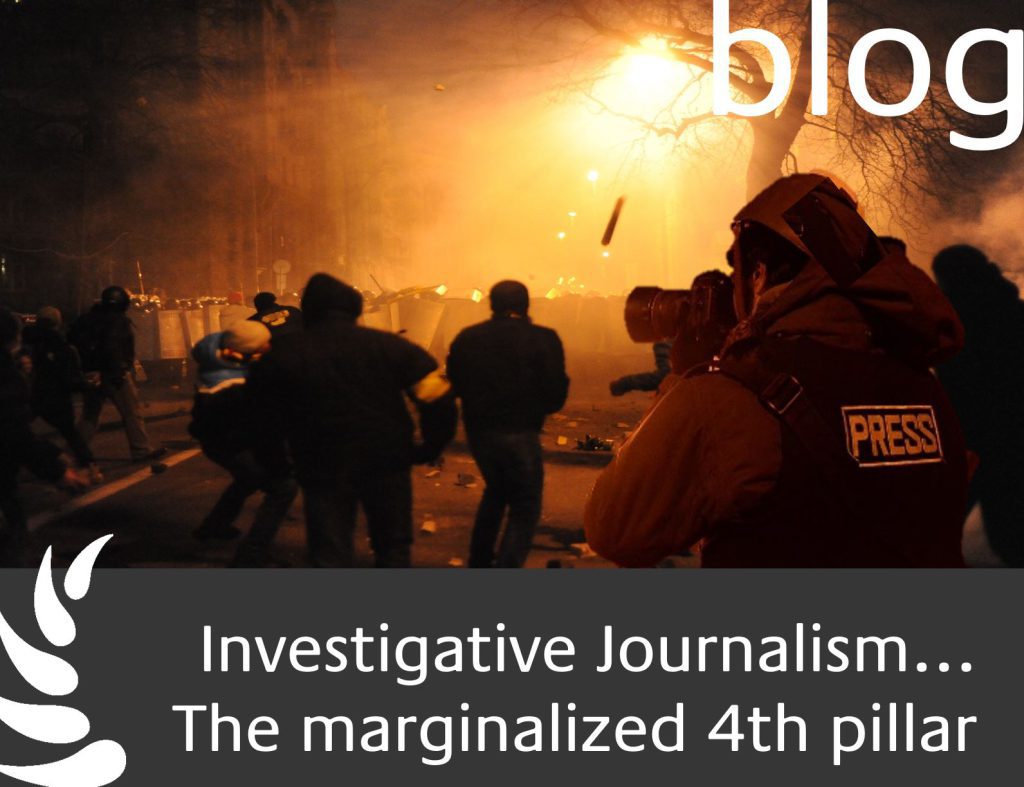Investigative Journalism – The marginalized 4th pillar.
By Chacko Jacob
It is hard to comment on journalism as a whole, as it is too wide a profession.
There are types of journalists that have a regular schedule, there are types who’s lives are at risk for what they report about, and a thousand other variants.
But here we talk about the ones that stick their necks out to get factual information to people.
In most countries there is too much power vested in one of the pillars of democracy or colluding between two or more of them.
What is the situation in your country? Is the legislature gaining too much power over a pandemic? Is it the military elite taking the reins through a puppet installation of a president, prime minister, premier? Is organized crime influencing grassroot elections? Is the judiciary bending to the will of the legislature? The symptoms of an ailing democracy are many… The media has the unique responsibility of keeping the rest of civilized society accountable.
Yes… there are outlets that are just in the business of propaganda and disseminating false information for profit and power. But like mentioned earlier, it is a wide profession.
It is this fundamental aspect of journalism, the fact that they are responsible for communicating what’s going on to the masses, that makes it an essential service (possibly the most important one?) that upholds democracy through well informed citizens.
The problem is that lying, and deception are a part and parcel of the way our establishments work. We rely on people that are willing to put their lives in danger to bring us the truth.
Mexico saw 9 journalists killed in 2020 alone. Over the past 10 years, in India, at least 55 journalists made the ultimate sacrifice. China, Eritrea, Haiti, the West Bank, and Russia are among the most dangerous places to practice this profession. Basically, wherever there is a lot of corruption, human rights abuse, and other malaises to unearth, is where being a journalist becomes a dangerous job.
Since 1980, there have been two massive disruptions, that changed how information is propagated and consumed:
– 24/7 news was the beginning of trying to get people addicted to their screens.
A case that was one of the most divisive for its time, the OJ Simpson murder trial, was the one that made CNN go 24/7 in the 80s (CNN is nowadays known as a progressive news channel). This was clearly a very entertaining format of TV-news that the rest of the world copied very quickly.
– Social Media finally perfected providing dopamine hits from personal devices.
Social media is now the bastion of personalized sources for all information. Be it politics, entertainment, education, or anything else. All accessible at the touch of a button. It revolutionized the information dissemination system that was valid until it came along… As Edward Snowden explains, the fourth pillar has lost the role of being a gatekeeper of information dissemination.
In this day and age, we have to expand our view, of what a large part of media truly is: polarized propaganda machines vying for your attention through incendiary, entertaining, bias confirming content. Differentiating between what’s reliable and not is key. There is suddenly enormous pressure on the average consumer to be discerning. Investigative journalists that are in most danger however, are usually found far from the scene described above. Journalists who work for local newspapers/magazines/small websites and who shine a light on local corruption are the ones who seem to be at most risk.
It is unfortunate, that 24/7 TV news and Social Media drown out their voices.
We all have a duty to defend journalists in their quest to uncover truths. But how do we cut through the BS of today’s situation and get to the reports that truly matter:
Two suggestions to be better informed:
– Wean yourself off from 1-minute news services.
People’s lives are pretty complicated… The world even more so; therefore, it takes more than a minute to acquire truthful information about the world you live in.
– Abandon sources that cause your opinions/views to hate someone/some group.
* Not dislike, that’s just superficial,
* disagree, the right kind of conflict is emancipating, or
* disassociate with, which in extreme cases has to be done.
This will prevent you from going down rabbit holes that pervert your world view and can create deep divisions in society.
By making sure that we are listening to reliable sources by cutting through all the noise, we put a spotlight on those truthful journalists that must be protected at all costs, and it then becomes harder for the offended powers to make them “disappear”.
Journalistic investigation must be a protected right because a crumbling fourth pillar, hurts any democracy.


Chacko:
It is just the truth what you say – and investigative journalism is a noble job, today more than any time before perhaps.
With your permission I’m reposting this on Stick Your Neck Out, my Giraffe-Heroes blog. If you mind we’ll take it down of course.
take good care, tom